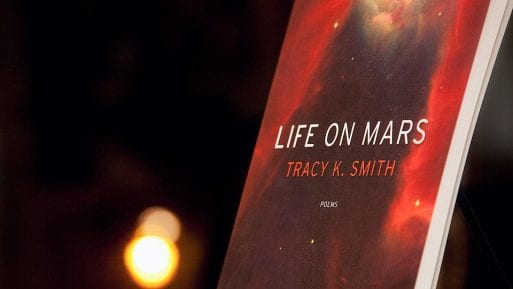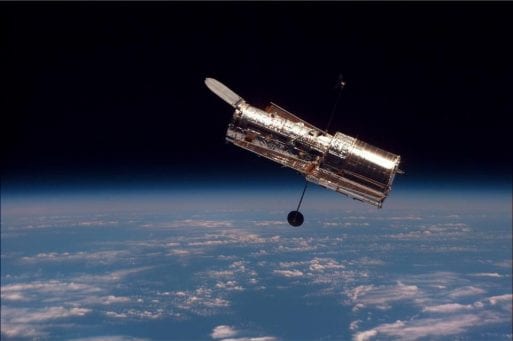
Tracy K. Smith
Credit: poetryfoundation.org
Tracy K. Smith, who served as Poet Laureate of the United States from 2017 to 2019, wrote a brilliant poem called “My God, It’s Full of Stars,” which appears in her Pulitzer Prize-winning 2011 volume of poetry titled “Life On Mars.” “My God, It’s Full of Stars,” along with the rest of the poems in “Life On Mars” can be read as an elegy for the poet’s late father, Floyd William Smith.
Floyd William Smith’s life had an impressive trajectory: He was a black man who grew up in overtly racist, pre-Civil Rights Alabama who went on to work as an optical engineer on the Hubble Space Telescope for NASA. That telescope, launched into space in 1990, helped astronomers determine the age of the universe and discover dark energy, the counter-gravitational force that causes the universe to expand at an accelerating rate.
New York Times writer Dan Chiasson described Smith’s collection as evoking the “shared situation of poets and astronomers, squinting to glimpse immensity.” The poems in “Life on Mars” are a deep bow to a father who spent much of his career dealing with matters of the universe: the poems in the collection are called things like “The Universe as a Primal Scream,” “The Weather In Space,” and “My God, It’s Full of Stars.”
“Life on Mars” is a journey through the poet’s own stages of grief. Smith’s collection contains 33 free-verse poems. The book opens with a single poem as its epitaph — “The Weather in Space,” and the other 32 poems are divided into four sections, titled simply “one,” ‘two,” “three,” and “four.” In each section, the poet nudges one step further towards acceptance of her father’s death and making sense of her own grief. Threaded through the collection is the poet’s deep need to understand death, and what has happened to her father. “My God, It’s Full of Stars” appears in section one of the collection.

Credit: rolexmentorprotege.com
“My God, it’s full of stars” is a line from Arthur C. Clarke’s novel “2001: A Space Odyssey.” The line also appears in Stanley Kubrick’s 1968 film by the same name. It was a comment uttered by the protagonist and fictional astronaut David Bowman as he entered the Sentinel, a huge, black, rectangular prism floating above Jupiter.
“My God, It’s Full Of Stars” is one of Smith’s most effective poems in the collection. The poem brings us to the set of the film. In the following stanza, shooting a scene of the film is described in such a way that it could be a metaphor for living a life:
On set, it’s shot after shot till Kubrick is happy,
Then the costumes go back on their racks
And the great gleaming set goes black.
In section three of the five-section poem, Smith suggests that perhaps we have erred in believing we are alone in the universe. Maybe we are not simply blips on the radar of time and space that disappear after death. Maybe space is “choc-full of traffic,” and we are just oblivious to it. Perhaps our dead are out there in space, privy to the knowledge we can’t access here in our mortal bodies on earth:
Maybe the dead know, their eyes widening at last,
Seeing the high beams of a million galaxies flick on
At twilight…

Hubble Telescope
Credit: forbes.com
In the final stanzas of the poem, Smith reflects on the Hubble’s early technical problems, which were eventually resolved:
The first few pictures came back blurred, and I felt ashamed
For all the cheerful engineers, my father and his tribe. The second time,
The optics jibed. We saw to the edge all there is –So brutal and alive it seemed to comprehend us back.
The lines speak to the way that science and poetry intersect in their desire to understand and articulate the mysteries of the universe. Anyone struggling to make sense of grief and loss is grappling with that same desire. I wholeheartedly recommend “Life On Mars.” It is a beautiful, smart, engaging collection of poems with a lot of heart.

 “My God, It’s Full of Stars” by Tracy K. Smith
“My God, It’s Full of Stars” by Tracy K. Smith


 Recovering Cremation Remains After the Los Angeles Fires
Recovering Cremation Remains After the Los Angeles Fires
 “As Tears Go By” by Marianne Faithfull
“As Tears Go By” by Marianne Faithfull
 “The Sea” by John Banville
“The Sea” by John Banville














